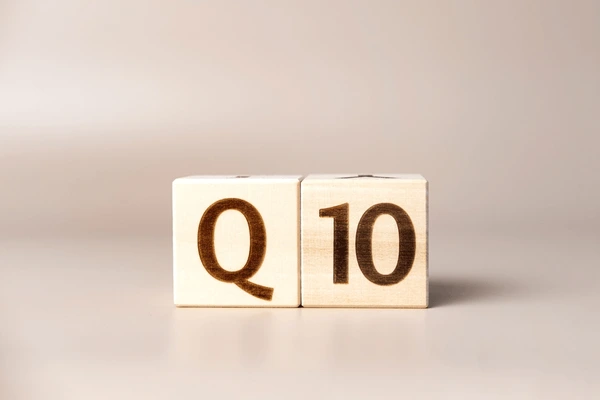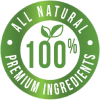Coenzyme Q10 is a fundamental molecule for the human organism. It occurs naturally in our bodies and plays a crucial role in overall health. In this article, we’ll take an in-depth look at this coenzyme, its benefits, how it works and why it’s often called “ubiquinone” or “ubiquinol”. You’ll also discover how this substance acts as a powerful antioxidant and what impact it can have on your well-being.
Definition and chemical structure of coenzyme Q10
Coenzyme Q10 (also known as ubiquinone and ubiquinol) is a lipophilic molecule closely related to vitamins. Essentially, it is an antioxidant essential for cellular energy production. Its name derives from the fact that it is ubiquitous in all the cells of our body.
Role of coenzyme Q10 in the body
This coenzyme plays several important roles in our bodies:
Cellular energy production
Coenzyme Q10 is mainly involved in the mitochondrial respiratory chain, which is essential for producing energy in the form of ATP (adenosine triphosphate). Without this coenzyme, our cells would not be able to generate enough energy to function properly.
Powerful antioxidant
As an antioxidant, coenzyme Q10 protects cells against oxidative damage caused by free radicals. This damage can lead to premature ageing and various chronic diseases.
- Neutralises free radicals: It helps to neutralise free radicals before they can cause cell damage.
- Cell membrane protection: By protecting cell membranes, it maintains cell integrity and promotes healthy physiological function.
Forms of coenzyme Q10: ubiquinone and ubiquinol
This coenzyme exists in two main forms: ubiquinone and ubiquinol. Each has its own characteristics and advantages:
Ubiquinone
Ubiquinone is the oxidised form of coenzyme Q10. It is this version that is commonly found in dietary supplements. Once ingested, ubiquinone is converted into ubiquinol by the body.
Ubiquinol
Ubiquinol is the reduced, active form of coenzyme Q10. This version is more effective because it can be used directly by the body without the need for prior conversion.
- Better absorption: Ubiquinol is better absorbed by the body than ubiquinone.
- Greater efficiency: As it does not need to be converted, it is immediately available to combat oxidative stress and produce cellular energy.
Food sources of coenzyme Q10
You can obtain coenzyme Q10 from a variety of foods. Sources rich in Q10 include
- Meat and fish : Offal such as liver and heart are particularly rich in coenzyme Q10. Red meat and oily fish such as salmon and tuna are also good sources.
- Green vegetables: Dark green leafy vegetables (such as spinach and broccoli) contain significant amounts of Q10.
- Nuts and seeds: Pistachios, walnuts and sesame seeds also contain this precious coenzyme.
- Pulses: Beans, lentils and chickpeas make a significant contribution to coenzyme Q10 intake.
Health benefits of coenzyme Q10
The health benefits of coenzyme Q10 are many and varied:
Cardiovascular support
Q10 helps maintain a healthy heart by improving blood circulation and supporting overall heart function. Studies indicate that it can reduce the risk of heart failure and improve the symptoms associated with heart disease.
Improved energy and reduced fatigue
Thanks to its key role in ATP production, coenzyme Q10 helps to increase energy levels and reduce feelings of fatigue, particularly in individuals suffering from Q10 deficiency.
Motor and neurological support
Research shows that Q10 could benefit people suffering from neurodegenerative diseases such as Parkinson’s disease. It helps protect neurons against oxidative stress and improves cognitive and motor functions.
Boosts the immune system
By acting as an antioxidant and producing energy for immune cells, this coenzyme boosts the immune response and helps fight infections.
Recommended doses and supplementation
For those who wish to supplement their diet with Q10, it is useful to know the recommended dosages:
- Prevention and maintenance: A typical daily dose is between 30 mg and 90 mg.
- Therapeutic treatment: For specific conditions such as heart failure or Parkinson’s disease, use higher doses of up to 200-300 mg, always under medical supervision.
Side effects and precautions
Although generally considered safe, coenzyme Q10 may cause certain mild side effects:
- Digestive disorders: Some individuals may experience stomach upset, diarrhoea or nausea.
- Drug interactions: It may interact with anticoagulant drugs such as warfarin. You should therefore consult a doctor before starting any new supplementation, especially if you are undergoing treatment.
In summary, coenzyme Q10 is a vital substance for various biochemical functions in the human body. Knowing and understanding its importance can make it easier to integrate it effectively into your health and well-being efforts. Whether it’s to support your heart, boost your energy or protect your cells, it offers significant benefits that can be appreciated by everyone.









